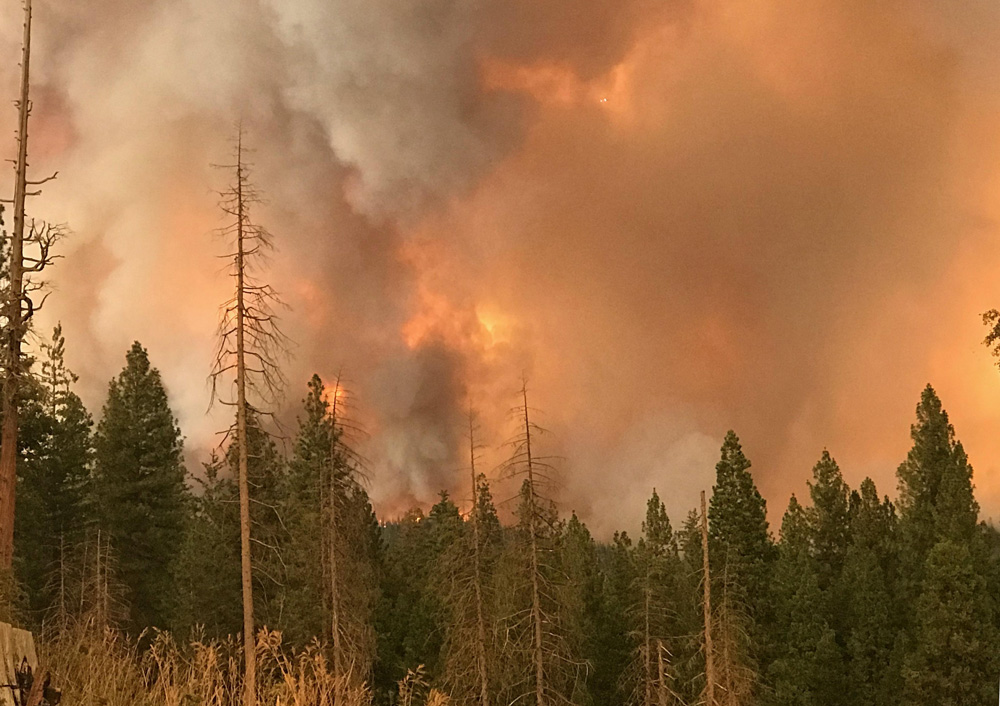
2018 Ferguson Fire in Mariposa County
Photo credit: USDA
June 1, 2022 - WASHINGTON, D.C. - U.S. Senator Alex Padilla (D-Calif.), joined by Senators Dianne Feinstein (D-Calif.), Kyrsten Sinema (D-Ariz.), Jacky Rosen (D-Nev.), Ben Ray Luján (D-N.M.), and Catherine Cortez Masto (D-Nev.), sent a letter to the leadership of the Appropriations Subcommittee on Interior, Environment, and Related Agencies urging them to provide $20 million in funding for a more equitable deployment of EPA’s air quality monitoring given the increase in wildfire smoke in the region.
“As you develop the Fiscal Year 2023 Interior, Environment, and Related Agencies subcommittee appropriations bill, we write to request that you provide $20 million in funding for the Environmental Protection Agency’s (EPA) wildfire smoke monitoring programs and that you include the below report language to ensure equity,” the Senators wrote.
“The President’s Budget requests $12.7 million for the EPA to improve communications related to wildfires and air quality and to expand local smoke monitoring capacity. However, as we continue to experience historic fire activity and resulting wildfire smoke across the western United States, we must ensure equitable monitoring for all communities. Therefore, we urge you to provide $20 million for this important work, and we ask that you include report language to increase equity and ensure that new monitors are placed in new areas that do not currently have adequate monitoring capabilities,” they continued.
Currently, EPA air quality monitors are clustered in affluent communities while disadvantaged communities struggle to have even a few sensors. As smoke becomes a yearly reality in California, we must build out our air quality monitors, which will increase the speed and accuracy of air quality data, but the platform on which individuals can access air quality information itself and increase community education about being safe during unhealthy times.
Padilla has been a leader in combatting all aspects of wildfires prevention and mitigation efforts. Last year, Padilla co-sponsored the Wildfire-Resilient Communities Act and Smoke-Ready Communities Act, two bills aimed at battling wildfires, protecting workers, and helping combat the effects of wildfire smoke. Padilla also co-sponsored the Smoke Planning and Research Act and Wildfire Smoke Emergency Declaration Act, bills that aimed to ensure that California has the federal resources it needs to protect communities impacted by wildfire smoke.
Full text of the letter is available here and below:
Dear Chair Merkley and Ranking Member Murkowski:
As you develop the Fiscal Year 2023 Interior, Environment, and Related Agencies subcommittee appropriations bill, we write to request that you provide $20 million in funding for the Environmental Protection Agency’s (EPA) wildfire smoke monitoring programs and that you include the below report language to ensure equity.
According to the Centers for Disease Control, exposure to air pollutants, like PM2.5 particles in wildfire smoke, can cause inflammation, alter immune function, irritate the lungs, and increase susceptibility to respiratory infections. Additionally, the harmful toxins from wildfire smoke can contaminate soil, water, and indoor dust. Inhaling these toxins are particularly harmful for older adults, children, and people with heart or lung disease, including asthma. As with many environmental hazards, wildfire smoke pollution disproportionately affects low-income and historically marginalized communities. To address this disparity, Congress must ensure that the tools our federal agencies use to inform the public about wildfire risks are accurate, equitable, and serve diverse communities.
The EPA’s wildfire smoke monitoring network utilizes technologies to support supplemental air monitoring in areas affected by wildfire smoke. The EPA and U.S. Forest Service (USFS) launched the AirNow Fire and Smoke Map in 2021, which combines data from EPA’s air monitoring network with data from low-cost sensors to improve air quality and smoke information available to the public in both English and Spanish during fire events. The air quality data is available for the public through AirNow, which consolidates the updated data collected from monitors positioned throughout the U.S. and makes it readily available. These monitors, however, are currently concentrated in more affluent communities, despite the fact that the dangers of wildfire smoke and poor air quality are not limited to these areas.
The President’s Budget requests $12.7 million for the EPA to improve communications related to wildfires and air quality and to expand local smoke monitoring capacity. However, as we continue to experience historic fire activity and resulting wildfire smoke across the western United States, we must ensure equitable monitoring for all communities. Therefore, we urge you to provide $20 million for this important work, and we ask that you include report language to increase equity and ensure that new monitors are placed in new areas that do not currently have adequate monitoring capabilities.
Wildfire Smoke Monitoring. – The Committee commends EPA for its efforts through the AirNow Fire and Smoke Map to better forecast and communicate the impact of wildfire smoke on communities. However, the committee is concerned that air quality monitors are not currently distributed equitably across impacted communities and provides $5,000,000 in addition to the budget request to increase the number and density of air quality monitors in traditionally underserved or under monitored communities.
As wildfires become increasingly frequent and destructive, smoke will become an ever more present reality in our communities as well as those across the country. It is critical that we be proactive in ensuring that our monitoring systems are well equipped to equitably protect public health from the hazardous effects of wildfire smoke.
Thank you for your consideration of our request.
Sincerely,
Source: Senator Alex Padilla








